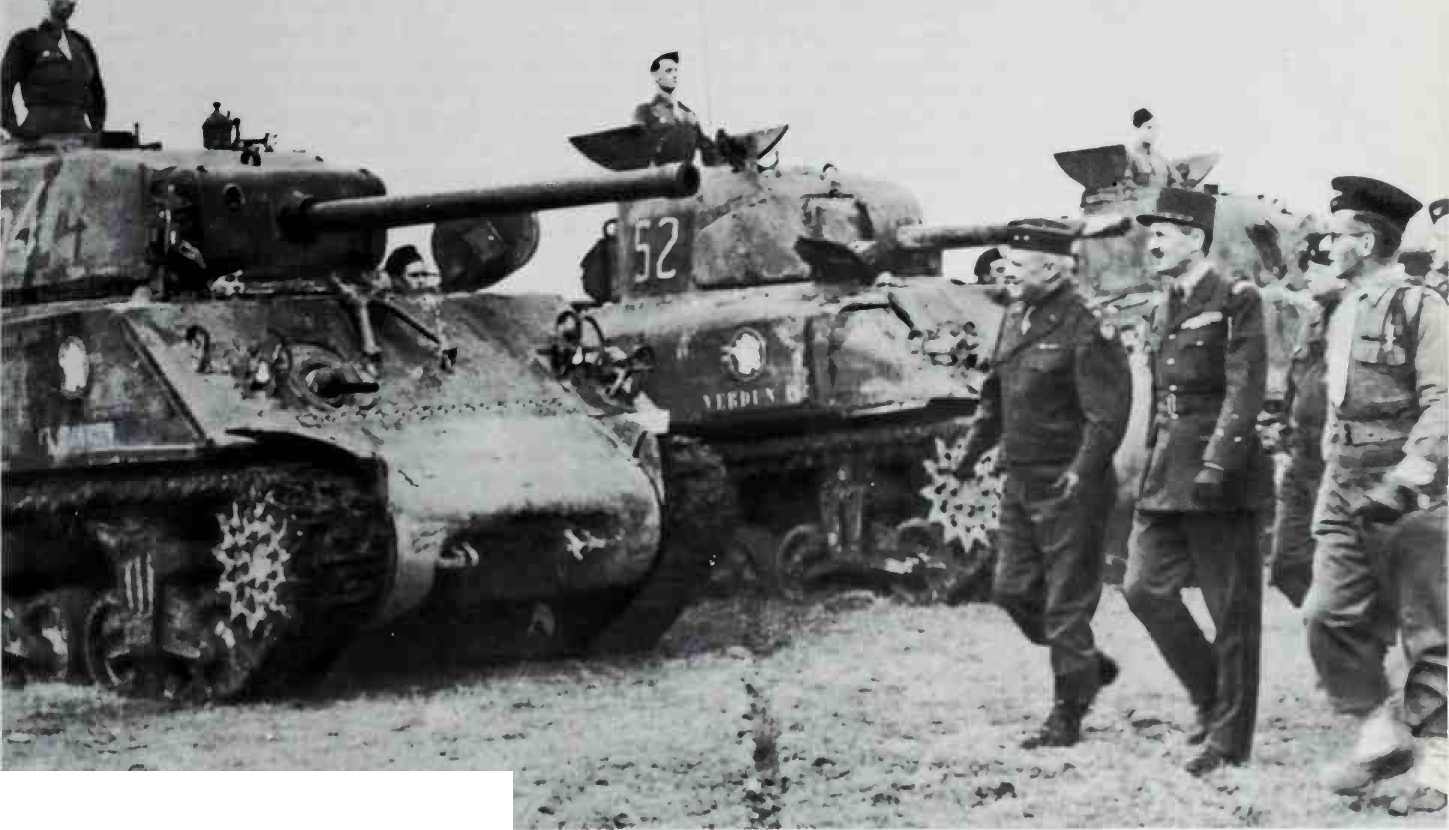
J - ¦
A General Leclerc (ivearing the kepij inspects the men and the machines of his French 2nd Armoured Division. After helping in the defence of Strasbourg during Operation "Nordwind”. the division was moved south as part of the French II Corps for the crushing of the Colmar pocket.
Before he could accept the German surrender, the offer of which was to be brought to him at Rheims by a delegation headed by Colonel-General Jodi, General Eisenhower still had to repel two attacks, one directed against his own authority, and the other against the 6th Army Group in lower Alsace.
On December 28, 1944, Eisenhower went to Hasselt, where Montgomery had set up his headquarters. He wanted to go over the plans for future operations with him, to begin as soon as the Ardennes pocket had been nipped off. Eisenhower and Montgomery had no difficulty in reaching agreement on the objective to be set for the offensive they were about to launch. Both favoured the Ruhr. But Montgomery thought that the "major crisis’’ that had just been resolved authorised him to adopt the claim he had pressed at the beginning of the preceding August. He wanted control of operations, and he thought himself the more qualified to bear the responsibility since Eisenhower had put the American 1st and 9th Armies under his command. Hence his letter to "Ike", dated December 29. Point 6 of this read:
"I suggest that your directive should finish with this sentence:
"'12 and 21 Army Groups will develop operations in accordance with the above instructions.
> Armoured vehicles (in the foreground Stuart light tanks) of the French Foreign Legion parade through the streets of Strasbourg.
A> Strasbourg Cathedral on the day of the city’s liberation.
'"From now onwards full operational direction, control, and co-ordination of these operations is vested in the C.-in-C. 21 Army Group, subject to such instructions as may be issued by the Supreme Commander from time to time.’ ” In writing this, Montgomery was disregarding the prudent advice contained in Brooke’s letter of December 24 to him: "I would like to give you a word of warning. Events and enemy action have forced on Eisenhower the setting up of a more satisfactory system of command. I feel it is most important that you should not even in the slightest degree appear to rub this undoubted fact in to anyone at S. H.A. E.F. or elsewhere.”
Eisenhower rejected his subordinate’s suggestion by return of post. But, even had he not done this on his own initiative, he would have been ordered to do so by General Marshall, who cabled him from Washington on December 30:
"They may or may not have brought to your attention articles in certain London papers proposing a British deputy commander for all your ground forces and implying that you have undertaken too much of a task yourself. My feeling is this: under no circumstances make any concessions of any kind whatsoever. I am not assuming that you had in mind such a concession I just wish you to be certain of our attitude. You are doing a grand job, and go on and give them hell.” The matter would have stopped there if, on January 5, 1945, Montgomery had not given a press conference on the Battle of the Ardennes, which drove the American generals to the limit of exasperation. The text of the conference was published by General Bradley and it can be said that although Montgomery polished his own image and took some pleasure in exaggerating the part played by British forces in the Ardennes, he did not criticise his allies or their leaders in any way.
The crisis reached flashpoint when Bradley informed his old friend Eisenhower that he would ask to be recalled to the United States rather than serve under Montgomery’s command. In view of the rumours spread by Goebbels’s propaganda services, Churchill thought he ought to step in, which he did in the House of Commons on January 18. His excellent speech made special mention of the allimportant part that the U. S. Army had played in the battle and placated everyone.
Besides this, another move of the Prime Minister’s contributed to relieving
The tension between S. H.A. E.F. and the |l 21st Army Group. As operations in Italy had slowed down considerably, it was suggested that Alexander was being wasted there. So Eisenhower’s deputy. Tedder, was to be recalled to ordinary R. A.F. service, his place being taken by Alexander. Tbougb tbis compromise did not win Eisenhower’s approval, it also came up against Montgomery’s decided opposition. If he could not control operations himself, he did not want to see anybody else get the job.
Nevertheless, Montgomery’s importunity had brought him within an ace of losing his own job. Only an emollient letter of apology personally from him to Eisenhower, written at the insistence of his Chief-of-Staff "Freddie” de Guingand, prevented a flnal showdown.




 World History
World History









